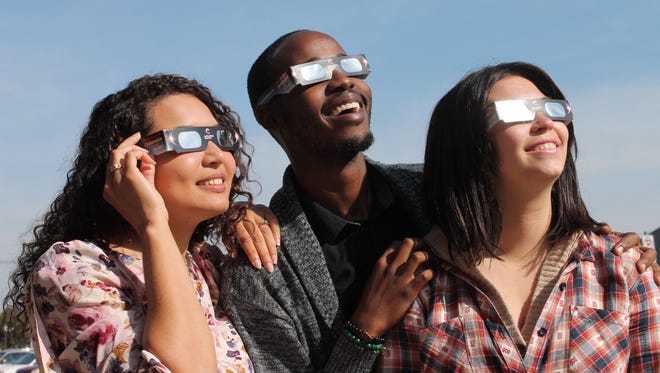Beware: Unsafe eclipse glasses are flooding market

LOUISVILLE — Could your eclipse glasses be counterfeit?
Maybe.
Eclipse glasses are a hot item right now as the United States prepares to be dazzled by a coast-to-coast eclipse Aug. 21. But some companies are skirting safety regulations and hawking unsafe wares to an unsuspecting public.
As a result, the American Astronomical Society has issued a word of caution about eye protection after reports of “potentially unsafe eclipse viewers flooding the market.”
Looking for the International Organization for Standardization logo and a label with ISO 12312-2 on it has been considered a good way to determine if eclipse glasses are up to snuff, but that’s no longer a guarantee, the society says on its website.
More:'Eclipse blindness' is a real thing. How to know which solar eclipse glasses are safe.
More:These 5 companies make eclipse glasses certified as safe. Here’s where you can find them.
"It now appears that some companies are printing the ISO logo and certification label on fake eclipse glasses and handheld solar viewers made with materials that do not block enough of the sun’s ultraviolet, visible and infrared radiation to make them truly safe,” according to the society.
To help the public, the society’s Eclipse Task Force has compiled a list of reputable vendors at eclipse.aas.org/resources/solar-filters.
“If we don't list a supplier, that doesn't mean their products are unsafe — only that we have no knowledge of them or that we haven't convinced ourselves they are safe," Rick Feinberg, a society spokesperson, notes in a news release.
Eclipse glasses are a must as "looking directly at the sun is unsafe except during the brief total phase of a solar eclipse (‘totality’), when the moon entirely blocks the sun’s bright face, which will happen only within the narrow path of totality," according to NASA.

In areas that will only get a partial eclipse, people who want to look directly at the sun during the event should use special-purpose solar filters, such as “eclipse glasses” or hand-held solar viewers, according to NASA.
Taking safety precautions, such as a wearing proper eye protection, is important to avoid solar retinopathy, which can lead to mild to moderate vision reduction or even central blind spots, according to a University of Louisville news release.
“You may have heard that you can do a lot of damage to your eyes when viewing an eclipse, and it’s true,” Mark Mugavin of the University of Louisville department of ophthalmology and visual sciences notes in the release. “During an eclipse, our normal reflexes that protect us from sun damage, such as blinking and pupil constriction, are more relaxed because the sun’s light intensity is significantly reduced.”

Laura Shelton, a first-grade teacher at the Discovery School in Shelbyville, wants kids from her school to enjoy the eclipse but also to be safe.
She bought a set of 50 glasses for the students from an online retailer but decided to order replacement glasses after determining that the first set wasn't from a verified manufacturer. She estimates she lost $30.
“It wasn’t so much the money I lost; it was just the potential for harm that bothered me,” Shelton said.
Follow Darla Carter on Twitter: @PrimeDarla

----
Tips for buying eclipse glasses
Here are some tips from the American Astronomical Society:
• Don’t search for eclipse glasses on the internet and then buy whatever pops up in the ads or search results. Check the society's list of reputable vendors before buying: eclipse.aas.org/resources/solar-filters.
• Check to see what you can see through the glasses. You shouldn't be able to see anything through a safe solar filter except the sun itself or something comparably bright, such as a bright halogen light bulb. If you can see lights of more ordinary brightness, and you're not sure the product came from a reputable vendor, it’s no good.
• If you glance at the sun through your solar filter and find it uncomfortably bright, out of focus, and/or surrounded by a bright haze, it’s no good.
• If you get your glasses from a friend who happens to be an astronomer, they're probably compliant. That's also usually the case with products from professional astronomical organizations, such as college and university physics and astronomy departments, and amateur-astronomy clubs.
• If you suspect that you got bad glasses, ask the seller for a refund or credit and replace them with a product from a reputable vendor.
• Before using your glasses, inspect them. If scratched, punctured, torn, or otherwise damaged, discard them.
• Read and follow any instructions printed on or packaged with the filter.
• Supervise children using solar filters.
Find more safety tips at https://aas.org or https://eclipse2017.nasa.gov/safety.